Caffe Ibis marks 35 years serving up bird-friendly values, great coffee
December 14th, 2011 Posted in BusinessStory & photos by D. Whitney Smith
LOGAN — Owners of the iconic local roasting company and coffee shop known to most as Caffe Ibis celebrated the company’s 35th year in business this month, shortly after adding the Utah Green Business of the Year award to their list of accolades.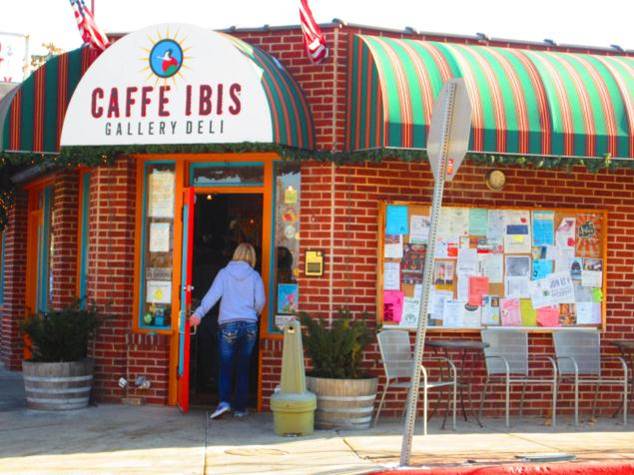
Co-owners Randy Wirth and Sally Sears — also husband and wife — look back on those years in business together with a nostalgic familiarity. The couple’s love for the business and for one another becomes evident as Wirth and Sears talk about the history of their company, while frequently finishing each other’s sentences.
“What most people don’t realize is that our café downtown is our touchstone to the community,” Wirth said, “but our main business is our wholesale (coffee roasting company). We also help people get into the business — we’ve helped with over 400 startups.”
Wirth, from California, and Sears, from New York, met as students at Utah State University in the early 1970s and eventually opened the Straw Ibis Herb and Grain Company, a wholesale health food store, in downtown Logan. A few years later Wirth and Sears made the move to 52 Federal Ave. and opened Caffe Ibis Gallery Deli and coffee shop.
“We were also — before we got into business — we were environmentalists,” Wirth said.
“We always had a conservation ethic, a very strong conservation ethic,” Sears added.
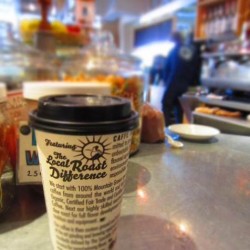 Anyone who has read one of the company’s compostable paper cups should know Caffe Ibis offers triple-certified coffee, which means it is certified organic, fair trade and shade-grown, Smithsonian bird-friendly.
Anyone who has read one of the company’s compostable paper cups should know Caffe Ibis offers triple-certified coffee, which means it is certified organic, fair trade and shade-grown, Smithsonian bird-friendly.
“Essentially, you’re talking about preserving a rainforest,” Wirth said about the shade-grown bird-friendly category. “The certification is an annual, on-the-ground certification for biodiversity. It’s very rigorous. In fact, most coffee people feel it’s overly rigorous.”
Wirth, who said Caffe Ibis was at the forefront of the bird-friendly movement, explained that bird-friendly coffee ensures North American migratory birds, which fly south in the winter to countries that grow and export coffee, will not face extinction due to loss of habitat from deforestation.
Researchers from the Smithsonian Migratory Bird Center in Washington, D.C., conducted a study that revealed since the 1950s fewer and fewer North American songbirds returned each year after winter, Wirth said.
“What (researchers) found by accident was the old-world shade coffee farms were the lifeboat for North American songbirds,” Wirth said. “So they set about designing a scientifically based certification that would maximize for bird habitat and pay farmers a premium for growing that way.”
To qualify as bird-friendly coffee, Sears said, the beans must also be grown and harvested organically.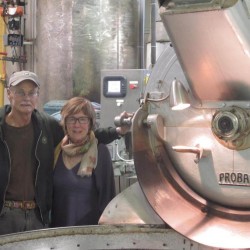
For coffee to bear the organic certification inside the coffee house, Wirth said it also has to be roasted by a certified organic roaster — a roaster used strictly for organic coffee only. Caffe Ibis Roasting Company houses three industrial-sized, German-made coffee roasters, which can roast up to 200 pounds of coffee at a time.
“We go through an extremely rigorous inspection once a year,” Sears said of the roasting company, which supplies coffee around the world, with most of its market being in the western United States.
The third certification most varieties of Caffe Ibis coffee boast is the fair trade certification, which means, according to literature printed by Caffe Ibis, coffee farmers and their families are guaranteed a fair payment for their crop regardless of current market values.
Fair trade also insures long-term relationships between coffee farmers and those who buy their product, which gives coffee farmers stability and thereby an opportunity to lift themselves and their families out of poverty and into viable economic standings.
“We were pioneers in the organic coffee movement,” Wirth said. “We’re also one of the original six roasters for fair trade coffee in the United States, and we’re one of the earliest Smithsonian roasters. Actually, we were roasting bird-friendly coffee before Smithsonian got involved.”
Wirth pointed out that not all of the company’s coffee meets each of the three standards but, he said, it is there for those who want it — and most regular customers do.
He said providing coffee that bears the triple certification is great, even though it makes for narrower profit margins, but it’s still important to have a great tasting cup of coffee. Most customers seem to agree, Caffe Ibis coffee is a high quality product.
“Just get a regular drip coffee,” said Logan native and self-proclaimed Ibis regular Neal Hansen. “Go on a Monday or Friday, get the Highlander Grogg (coffee), it’s one of their best ones. Give that a try and then try other light or dark ones, depending on your favorite flavor of coffee.” Hansen said anyone who drinks coffee should know Caffe Ibis has great coffee, and he’s been getting his coffee there since he started drinking it almost three years ago.
 Along with fresh-brewed drip coffee, Caffe Ibis also offers a wide range of espresso drinks and other non-coffee drinks such as the popular hot chocolate steamer, which consists of hot chocolate and steamed milk, said café manager Michelle Nielsen, who has worked 11 years for the company.
Along with fresh-brewed drip coffee, Caffe Ibis also offers a wide range of espresso drinks and other non-coffee drinks such as the popular hot chocolate steamer, which consists of hot chocolate and steamed milk, said café manager Michelle Nielsen, who has worked 11 years for the company.
“Before, (Sally and Randy) had a separate deli, a separate retail and a separate café,” Nielsen said, “all within the same building, but they were kind of sectioned off. Now the deli, the café and retail area are all behind the same counter.
“They really wanted to focus on the full-service end and spending more time with the customers — one on one.”
The deli offers a range of breakfast and lunch items from several seasonal menus. Nielsen said the menu changes based on what produce is available fresh from local farmers, depending on the current season.
She said local produce is not only offered in menu items but is also made available for purchase at Caffe Ibis. This is one of the many ways Wirth and Sears, who were also principal players in organizing the Cache Valley Gardeners’ Market in 1982, get involved in the community.
“One of our biggest things is our partnership with local farms,” Nielsen said. “We’re really emphasizing on that a lot more. I think that’s pretty cool, you know, we’re supporting the locals and they’re supporting us as well.”
Integration with the local community, Nielsen said, stems from long-time supporters of Wirth and Sears who have known the couple since they were a “natural, gourmet food supplier.”
The deli and coffee shop is also featured on the Cache Valley Food Tour, a list of local food and beverage producers and restaurants sponsored by the Cache Valley Visitors Bureau, which highlights the growing interest in support for local businesses in Utah.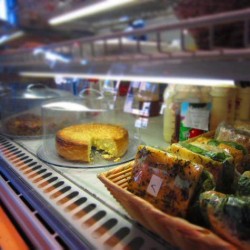
Caffe Ibis also participates with several non-profit organizations, Wirth said, such as Coffee Kids, Café Feminino and Grounds for Health. The roasting company also supplies coffee, which is bought from 26 countries around the world, to several local cafes, including those on campus at USU.
“Almost any event you go to in the valley is going to have Caffe Ibis coffee,” Nielsen said. “That’s another way people find out about us. Anyone who works up at the university is going to tell their friend, ‘Go to Caffe Ibis.’”
Community members and university faculty and students support Caffe Ibis with their business, but some of them also work there, such as 7-year employee and USU student Michaela Goldstein, one of the head baristas. Goldstein said when she moved to Logan from Ohio she applied for jobs at a lot of places but hoped to get hired at the café because she liked its welcoming environment.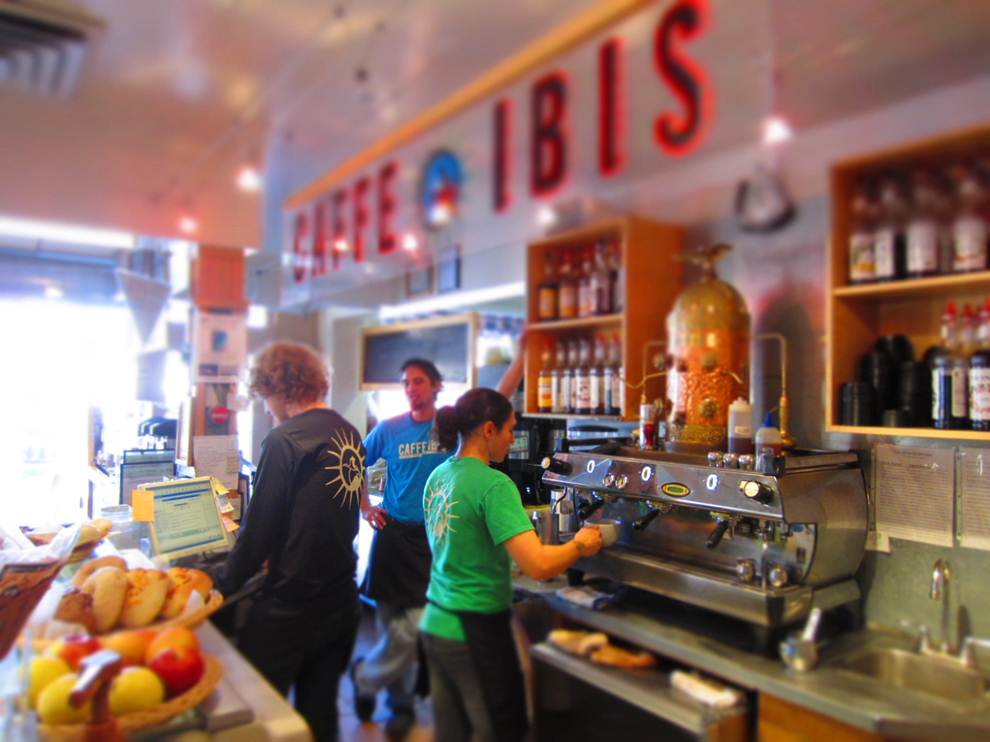
“I think this is where I found my niche here in Logan,” Goldstein said. “The customers have really become my family here — my family is still back in Ohio, but this is my home away from home.”
Being environmentally friendly and focused on giving back to the community are two values Goldstein said she shares with Wirth, Sears and the mission of Caffe Ibis in general.
Goldstein said she gives back to the community by getting to know the customers and giving them the best possible service she can.
“I can’t imagine being in Logan without the Ibis,” Goldstein said, “it definitely has a special place in my heart here. Sally and Randy have taken me under their wing and given me a place. I can’t imagine a better place than this and a better set of people running it.”
Wirth said he and his wife knew, when they took the step to begin roasting coffee on a wholesale level, they would have to grow beyond Cache Valley in order to maintain their high standards — selling fair trade, organic and bird-friendly coffee. He said in larger urban centers the growing concern for such environmental issues is better understood because there is better communication, and he hopes this trend will continue to grow locally, as well.
“It’s like the David and Goliath story,” Sears said. “We’re the David, and we’ve got the slingshot, and then there’s the giant. We just kind of plod along and keep doing what we need to do. It’s 35 years in business, and we are allowed every day to get up and feel good about what we do.”
NW
Tags: bird-friendly, cafe, Caffe Ibis, coffee roasting company, Logan, Utah Green Business

2 Responses to “Caffe Ibis marks 35 years serving up bird-friendly values, great coffee”
By randy wirth on Dec 14, 2011
Thank you for a beautifully written article on our company. I especially appreciate the time spent on certifications since consumer education is key to their support. It is through independent certification like Smithsonian “Bird-friendly” that consumers are tied directly to the farmer supporting biodiversity on the ground. Guatemala has been called the “lungs of North America” because of its amazing abundance of oxygen producing forests. If you like to breath, support “Bird-friendly”.
By Josh Epperson on Dec 14, 2011
Thanks for the awesome article and thanks to Caffe Ibis. Working for them has been one of my greatest career experiences. It’s great place to work. I love knowing that when I get up and go to work in the morning not only am I helping to provide quality coffee, but I’m helping the planet and coffee families around the world.